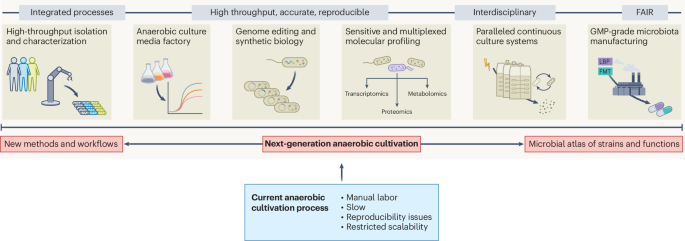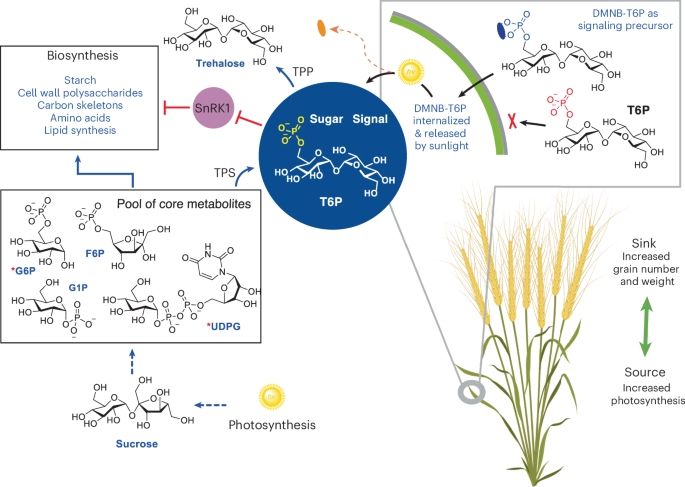Now Reading: Advancing Functional Microbiome Research with Next-Gen Anaerobic Cultivation
-
01
Advancing Functional Microbiome Research with Next-Gen Anaerobic Cultivation
Advancing Functional Microbiome Research with Next-Gen Anaerobic Cultivation

Swift Summary
- The article primarily focuses on advancements and challenges in culturing bacteria and studying the human microbiome.
- It presents historical research milestones, such as studies on butyl rubber stoppers used for anaerobic cultures (Hungate et al., 1966), and significant innovations to investigate uncultured bacteria (Lewis et al., 2021).
- key developments include the identification of new bacterial species from human feces, phylogenetic relationships of butyrate-producing bacteria, and proposals for redefining bacterial genera.
Direct links to articles referenced by researchers cover microbial culturomics (Lagier et al., 2012), emotional stress’s impact on gut flora (Holdeman et al., 1976), sulphate-reducing activities linked with methanogenesis in the large intestine (Gibson et al., 1988), and microbiome myths debunked in recent reports by Walker & Hoyles (2023).
Efforts in microbe identification have implications for health, ecology, evolution of bacterial taxonomy, and translational applications such as probiotics or personalized medicine.
Indian Opinion Analysis
The ability to culture previously unculturable microbes offers transformative potential not just globally but also within India’s burgeoning biotechnology and healthcare industries. India faces challenges related to public health issues like gastrointestinal disorders or antibiotic resistance-both of which could benefit significantly from microbiome-focused research. Innovations highlighted here also align well with India’s mission to expand indigenous R&D capabilities as part of its scientific autonomy goals.For india’s academic community and startups alike, better access to these international findings may enable cross-disciplinary collaboration across fields like agriculture, food technology, bioinformatics, and pharmaceuticals due to our dependence natural-resource more eco-conservative less animal-driven testing low-cost areas Too Scientific tribes-level barriers ruralQuick Summary:
- India’s scientific contributions in the study of microbiomes have involved significant research into microbial identification, diversity, and control mechanisms.
- Techniques like matrix-assisted laser desorption/ionization time-of-flight mass-spectrometry (MALDI-TOF MS) are revolutionizing microbial identification by addressing challenges in ecological applications.
- Studies emphasize cultivating previously “unculturable” human microbiota to uncover novel taxa and ecological functions.
- Research on microbial genomes has advanced India’s position in global efforts for genome-linked metagenomic analysis while enabling higher precision synthetic communities targeting gut health.
- Applications include addressing industrialized human microbiome adaptations, ecological decolonization strategies against bacteria such as Enterobacteriaceae, and leveraging cultured libraries to enhance taxonomy understanding.
Indian Opinion Analysis:
India’s ongoing focus on microbiome research highlights its potential role as a key player in global biotechnological advances, notably concerning human health and agricultural sustainability. tools such as MALDI-TOF MS combined with deeper genome sequencing open doors for India’s scientific community to solve ecosystem-specific issues like antibiotic resistance or gut health resilience tailored specifically for the Indian population’s unique genetic makeup and dietary culture. Such forward momentum could serve regional goals of enduring agriculture while furthering collaborations at an international scale with biotechnology firms looking at partnership models globally aligned [Read Full Study]Quick Summary
- The article explores advancements in gut microbiome research, focusing on culture-based studies and high-throughput methodologies.
- Multiple studies provide insights into bacterial diversity, immunity growth, ecological dynamics across populations, and the functional evolution of uncultivated taxa.
- The use of automation, machine learning, and anaerobic single-cell dispensing has facilitated breakthroughs in cultivating previously inaccessible microbial species.
- Recent investigations have extended known bacteriological complexes to include more species with distinct associations to host conditions.
Indian Opinion Analysis
The advancements highlighted demonstrate a growing ability to decode complex ecosystems like gut microbiomes using innovative approaches that can aid health sciences globally-including India’s developing medical sector. With India’s genetic diversity and rising incidences of lifestyle ailments linked to gut health, bolstered research infrastructure could help translate these findings into tailored therapies or preventative strategies for its population.For India to fully capitalize on this frontier science, increased collaboration with global institutions may be essential-alongside investments in automation technologies to overcome existing limitations in microbial culturing locally.
Read moreQuick Summary
- A new study explores advanced methodologies for cultivating and profiling gut microbiota,emphasizing automation,high-throughput systems,and machine learning techniques.
- Innovations discussed include anaerobic screening methods that identify effective compounds against gut bacteria within microbial communities,Raman-based platforms for sorting live cells by functional properties,and droplet-based cultivation approaches targeting antibiotic-resistant strains.
- Techniques extend to genomic workflows enabling strain-level analyses at lower costs and real-time adaptive cycles integrating design-build-test-learn systems for research efficiency.
- Applications are focused on furthering understanding of human intestinal microbiota through in vitro modeling and in vivo augmentation experiments to improve health outcomes.
Indian Opinion Analysis
The described advancements in microbial cultivation hold importance for India-a nation grappling with antibiotic resistance and complex gut-health issues due to its diverse population’s dietary habits. Enhanced capabilities such as high-throughput profiling could bolster India’s scientific infrastructure by aiding local researchers in analyzing native microbiomes comprehensively while addressing public health concerns with targeted interventions. Moreover, the affordability of these technologies offers promise in democratizing access for institutions beyond major cities or flagship projects like AIIMS or ICMR labs. The long-term benefits might include improved diagnostic tools tailored specifically to Indian lifestyles as well as drugs derived from deeper understanding of local microbiome compositions-all integral steps towards bolstering healthcare equity across rural and urban populations.Read more: linkQuick Summary:
- The article focuses on recent advancements in gut microbiome research, emphasizing innovative methods for genetic manipulation and cultivation.
- It highlights culture-enriched profiling techniques, high-throughput media development, and genetic tools aimed at recovering previously inaccessible bacterial species.
- Specific studies explore phenotypic trait prediction using machine learning and improved genetic systems for gut bacteria manipulation.
- Findings reveal the role of mucin in bacterial colonization of the human gut and its influence on host metabolic pathways such as sterol biosynthesis.
Indian Opinion analysis:
The ongoing progress in understanding the gut microbiome carries significant implications for India. With a rising burden of lifestyle-related diseases like diabetes and obesity, precise microbiome research opens pathways to personalized medicine tailored to Indian dietary patterns and genetics. This could revolutionize healthcare by addressing root causes at a microbial level rather than symptoms alone. however, scalability, affordability, and ethical considerations will be pivotal challenges in translating lab findings into actionable interventions suited for India’s diverse population.
Quick Summary
- The article appears to focus on advances in genetic manipulation and microbiome research, profiling discoveries related to gut bacteria and their functional genetics.
- Multiple studies highlight biotechnology tools such as transposon libraries, CRISPR-based genomic approaches, and tunable gene expression methods reducing complexities in microbial ecosystems.
- Findings explore bacterial drug metabolism, glycan breakdown pathways, intestinal inflammation prevention mechanisms via microbiomes, and phenotypic inference for Escherichia coli strains.
- These scientific breakthroughs aim at addressing gut health issues while enabling high-throughput assessments of genetic functionality across bacteria populations.
Indian Opinion Analysis
The detailed inquiry into gut microbiota holds promise for improving healthcare globally, especially in countries with significant gastrointestinal health burdens like India.Considering 70% of India’s population relies on traditional diets that interact dynamically with the gut environment, extensive microbial studies may pave the way for tailored nutritional or pharmaceutical solutions to prevent chronic illnesses.India’s role could emerge as pivotal if funding strengthens related biotechnological tools enhancing disease prediction models or scalable genomic interventions domestically.
For read more: PubMed Central | Google Scholar | Nature Article Reference.Quick Summary:
No specific news article related to India has been provided in the raw input text above. The information largely pertains to scientific research on microbiota and gut microbial ecosystems based on various referenced studies. There were no clearly stated facts or quotes relevant to Indian socio-political, economic, or cultural context.
Indian Opinion Analysis:
While science on microbiotas may seem distant from immediate national concerns, such research has critical implications for India’s healthcare and biotechnology sectors. Given India’s growing emphasis on innovation and medical technology, advancements in understanding gut ecosystems may provide opportunities for local industries focused on probiotics, pharmaceuticals targeting gastrointestinal diseases, and personalized medicine development. For policy-makers and researchers alike, fostering collaboration between academia and industry could yield long-term benefits rooted in such global knowledge streams.
Read more: LinkQuick Summary
- The raw text consists of references to scientific studies and articles focusing on microbiome research,interactions between gut microbes,and innovative technologies used in microbial experimentation.
- Key topics mentioned include polyphenols affecting microbiota resistance (Clostridioides difficile),dietary emulsifiers’ impact on the human gut microbiota,antibiotic response models via MiniBioReactor Arrays,microfluidic cultivation technologies for “microbial dark matter,” co-cultivation for genomic dissection of bacteria sub-communities,and RNA-seq methods across species to study host-microbe dynamics.
- Several article citations are from journals like Nature, Scientific Reports, Frontiers in Microbiology, and others targeting advanced techniques for exploring microbial ecosystems.
Indian Opinion Analysis
The specialized focus on emerging microbiome science underscores its potential relevance to India’s healthcare and agricultural sectors. With India facing growing concerns over antibiotic resistance, targeted microbiota modulation could unlock novel solutions for improving drug efficacy while addressing diseases like Clostridioides difficile infections. Furthermore, microfluidic technologies have implications for advancing biological research within Indian laboratories by enabling more cost-effective experimentation at scale.
Neutral observation also notes the importance of dietary habits-such as emulsifier consumption-on gut health outcomes. Given India’s diverse food landscape rooted in traditional diets versus increasing packaged food use, this area may warrant further attention domestically. Collaborative endeavors could align Indian institutions with global advancements seen in these referenced studies.
Read more: Links from SourceQuick Summary
- The article discusses advancements in microbiology and proteomics, focusing on bacterial interactions, RNA modifications, and microbial metabolites.
- Key developments include transcriptomic studies of bacteria-drug pairs, gut microbiome perturbation research, and new insights into single-bacterium proteomics.
- highlighted research spans topics like yeast-bacteria metabolic cross-feeding and novel tools for enriching bacterial phosphopeptides.
Indian Opinion Analysis
The insights from this article carry significant implications for India’s vast pharmaceutical sector and microbiome-related biotechnology industries.Emerging methodologies such as high-throughput transcriptomics could enhance India’s drug discovery pipeline while improving disease diagnostics rooted in gut health research. Additionally, advancements in single-cell bacterial proteomics have the potential to strengthen India’s genomic initiatives by enabling precision medicine practices focused on specific microbial profiles affecting human health.
For more details: Read Original ArticleQuick summary
- The article references various studies and academic research focused on microbial communities, bacterial genome sequencing, and microbial biotechnology innovations.
- Key topics include high-throughput cultivation protocols, synthetic microbial communities for natural applications, bacterial identification techniques using machine learning and MALDI-TOF mass spectrometry, and also advancements in metabolic engineering using automation-assisted phenotyping tools.
- Contributions from global publications such as nature, BMC Bioinformatics, and ISME Communications highlight the growing interest in microbiology-driven solutions for industries like agriculture and healthcare.
Indian Opinion Analysis
The referenced studies collectively underscore the significance of microbiological advancements globally.For India,a country deeply invested in agronomy,healthcare innovation,and biotechnology-based solutions for its expanding population challenges-these emerging tools provide an possibility to enhance pathogen tracking methods or foster eco-friendly crop systems using tailored synthetic microbial communities. Furthermore, India’s emphasis on scaling healthcare systems could benefit greatly from rapid identification technologies powered by AI or machine learning. However, meaningful adoption will require policies around access to high-throughput equipment alongside bolstered national capacity-building programs aligned with biotech R&D investments.
Read more: PubMed Reference LinkQuick Summary
- Article discusses advancements in microbiome research and bioinformatics, notably synthetic microbial communities.
- Developments include rational design of bacterial consortia for human health applications such as treating colitis and preventing infection recurrence.
- Tools like PyCoMo (Python-based),robotic platforms,and high-throughput profiling are highlighted to analyze microbial communities more efficiently.
- Studies reference tailored gut microbiota treatments, automated workflows enabling adaptation in microorganisms, and systematic reviews on fecal microbiota transplantation outcomes.
Indian Opinion Analysis
India stands to benefit from breakthroughs in synthetic microbiomes as it moves towards advanced healthcare solutions for chronic illnesses like colitis or infections tied to the gut flora. With a growing emphasis on automation and bioinformatics tools globally, Indian biotech firms may leverage these innovations for scaling personalized medicine initiatives at reduced costs. The request of robotic workflows may further support India’s goal of achieving precision healthcare while aligning with its burgeoning technological capabilities.
Read more: Provided referencesQuick Summary
- A growing body of research highlights the therapeutic potential of microbiota restoration techniques for managing gastrointestinal ailments.
- Various studies focus on fecal microbiota transplantation (FMT) as a treatment for recurrent Clostridioides difficile infections, ulcerative colitis, and other conditions.
- Synthetic bacterial consortia and live biotherapeutic products are emerging as promising alternatives to traditional treatments.
- Research underscores the importance of microbiome diversity in providing resistance against pathogens through competitive nutrient blocking mechanisms.
- Scientists advocate for collaborative microbial cultivation techniques to enhance therapeutic efficacy in combating multidrug-resistant infections.
indian opinion Analysis
The expanded understanding of microbiota restoration therapies could present transformative advancements in healthcare globally and holds particular relevance for India. Gastrointestinal diseases like ulcerative colitis, alongside recurring bacterial infections such as Clostridioides difficile, are concerns within India’s public health ecosystem. The exploration into fecal transplants or synthetic therapeutics can complement existing medical solutions if adopted responsibly. Additionally, the emphasis placed on cultivating microbial diversity aligns well with India’s traditional practices that value natural remedies but needs rigorous scientific validation under modern frameworks. Collaborative approaches between Indian scientists and global experts may accelerate breakthroughs while ensuring affordability and accessibility.

























